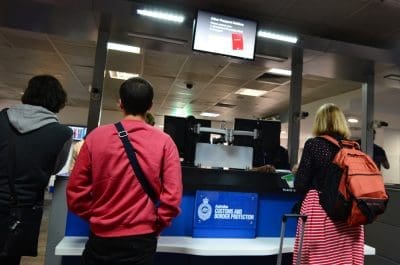FARMERS have welcomed a $47.1 million dollar boost to the nation’s biosecurity system thanks to the Australian Government’s new fees and charges system for importers.
The National Farmers Federation has recognised the additional financial injection into Australia’s biosecurity system over the past year, confirmed by Agriculture Minister Murray Watt today.

The additional funding has been delivered because of the Federal Government’s sustainable biosecurity funding reform, which increased fees and charges on importers to achieve full cost recovery from 1 July 2023.
NFF president David Jochinke said the NFF had long called for a cost recovery model to help provide sustainable funding to protect Australia from pests and diseases.
“Keeping fees in step with the actual costs of delivering biosecurity activities is sensible – far more sensible than the Biosecurity Tax lobbed at agriculture as part of the same funding reform.
“The levy was a frustrating distraction for industry and politicians alike.
“While we’re still waiting to see whether the Government will withdraw the failed levy legislation, it’s great to see us all return the focus to ensuring a strong biosecurity system for the benefit of all Australians.
“This could not come at a more pertinent time as we face down some very real and serious threats, like variants of Avian Influenza.
“We now look forward to working with the Government to further progress Australia’s biosecurity system.
“This includes an open and transparent conversation with the Government about exactly what trade impediments exist to implementing a container levy, progressing the National Biosecurity Strategy, and continuing to build biosecurity awareness and best practice.”
NSW Farmers view
NSW Farmers Biosecurity Committee Chair Ian McColl said the new cost recovery mechanism was a strong step towards better biosecurity funding for the future, with the proposed biosecurity tax on farmers now defeated in the Senate.
“Continued biosecurity funding is essential – and on that we can all agree – but a greater level of cost needs to be borne by the risk creators,” Mr McColl said.
“Many previous biosecurity breaches have come in via container products, and yet often, farmers have been left to carry a significant burden of the cost associated with managing biosecurity outbreaks.”
Mr McColl said it was imperative further solutions for biosecurity funding were explored, with a container levy one of the measures the Australian Government could implement to equitably recover costs.
“A charge on import shipping containers is just one of these ways we could ensure that funding draws on our risk creators, rather than just our farmers, to bolster our borders and other measures to minimize biosecurity risk,” Mr McColl said.
“Looking at all the options available and developing better biosecurity solutions is essential if governments want to protect our borders and keep our communities safe from these biosecurity risks.”
In 2023, in conjunction with the implementation of new charges, the Department of Agriculture Forestry and Fisheries committed to an annual review of regulatory charges and made changes to legislation to include indexation.
In 2024, the department will embed the annual review and apply indexation to regulatory fees and charges. All legislated regulatory charges that are subject to an indexation provision were increased by 4.1pc on 1 July.
Indexation of legislated rates does not require changes to legislation, new rates for 2024-25 are the calculated replacement amounts described in the 2024-25 Biosecurity CRIS and pricing tables.
Source: NFF, NSW Farmers
